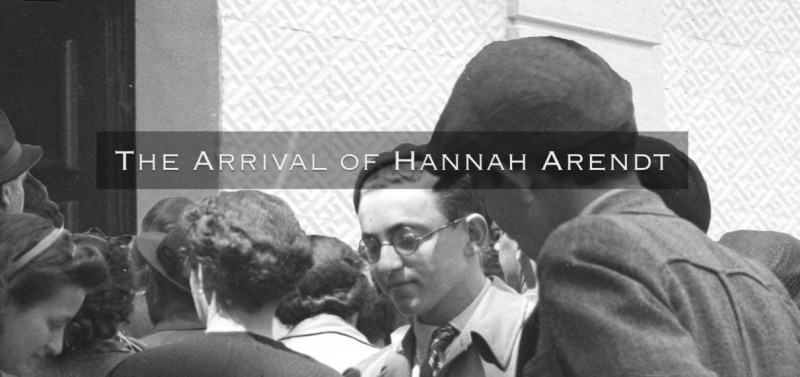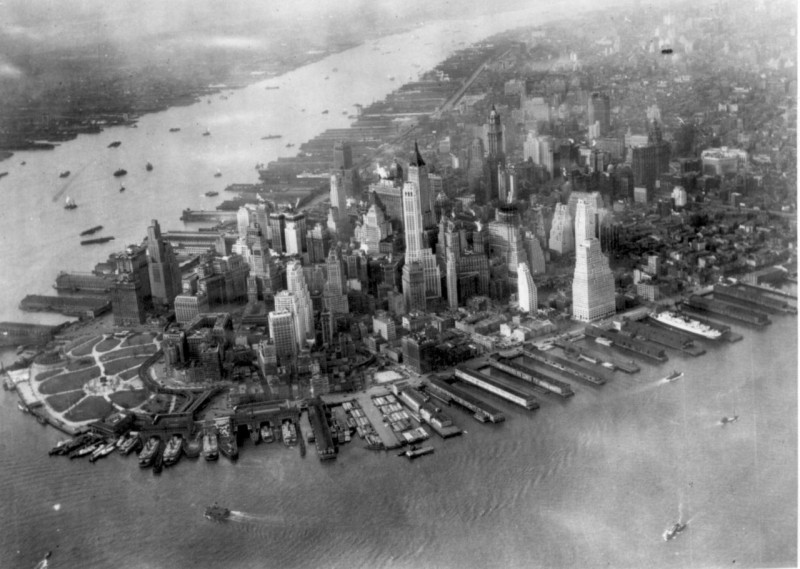
The Arrival of Hannah Arendt
This film describes the arrival of Hannah Arendt - a Jewish, German-American political theorist and publicist - in New York and her reflections on flight and helping people start over.

Wir kamen am 17. September 1937 in New York an, es war ein glühendheisser Tag, und dennoch liefen die Frauen mit Pelzen den Kai entlang. Das war die erste Überraschung. Dann haben wir eine kurze Zeit am Broadway 151. Querstrasse gewohnt. Doch meine Tante entpuppte sich als stockamerikanisch, sie wollte von den Problemen deutscher refugees nichts wissen. Sie meinte, wir wären sehr reich. Nun, das war einmal. Sie dachte, wir hätten all unser Geld mitgebracht. Dem war aber nicht so. Die Wirklichkeit sah umgekehrt aus. Sie meinte, wir brauchten nicht zu arbeiten. Im Gegenteil, bald hatten wir kein Geld mehr. Wir wollten uns von ihr auch nichts schenken lassen. Wir waren doch so stolz, wir waren doch so deutsch. Ich habe dann zu meinem Mann gesagt: Komm, lass uns gehen. Dies ist kein Platz für uns. Wir sind dann in die Bronx gezogen. Ich habe als Schwester im Montefiore Hospital gearbeitet. Ich wurde zur Hauptverdienerin und musste mein Staatsexamen wiederholen, die Anforderungen sind hierzulande höher.
Das Hauptproblem war: Mein Mann fühlte sich in seiner männlichen Würde unterbunden. Er fand nur Aushilfsarbeiten. Ich sagte ihm: Hör mal, in Amerika arbeiten die Frauen. Schlag dir die Idee aus dem Kopf, dass du mich ernähren mussst, das kommt nicht in Frage. Drüben wäre ich zwar eine Hunderttausend-Mark-Heirat wert gewesen, aber hier stehe ich meinen Mann. Nun, er hat gelacht, und schliesslich hat auch er Arbeiten gefunden, die mehr seinen Fähigkeiten entsprachen.

We arrived in New York on September 17, 1937, it was a blazing hot day, and yet women were walking along the wharf with furs. That was the first surprise. Then we lived for a short time at Broadway 151st cross street. But my aunt turned out to be stock American, she didn’t want to know about the problems of German refugees. She thought we were very rich. Well, that was once. She thought we had brought all our money with us. But this was not the case. The reality was the other way around. She said we didn’t need to work. On the contrary, soon we had no more money. We didn’t want her to give us anything either. We were so proud, we were so German. Then I said to my husband: Come on, let’s go. This is no place for us. We then moved to the Bronx. I worked as a nurse at Montefiore Hospital. I became the main breadwinner and had to repeat my state exam, the requirements are higher in this country.
The main problem was: My husband felt that his masculine dignity was being undermined. He only found temporary work. I told him: Listen, in America, women work. Get the idea out of your head that you have to feed me, that’s out of the question. Over there I would have been worth a hundred thousand mark marriage, but here I stand my ground. Well, he laughed, and eventually he found work that was more in line with his skills.
Hilda Epstein was a German nurse born in Karlsruhe into a religious Jewish family. She learned infant care in Heidelberg, later moved to Frankfurt, where she passed the nursing exam. She aspired to attend the Social Women’s School to become a welfare nurse. Due to the Hitler events, many things came to a head and she remained attached to the Jewish Hospital in Frankfurt. Later threatened with death in Nazi Germany, she obtained the affidavit with the help of her aunt from the USA and fled with her husband first to Washington and later in 1937 to New York. Shortly after her escape, she became the main breadwinner in the family because her husband could not find work. Because of poverty, the couple decided not to have children. In 1944, Hilda received American citizenship. In 1970, because of a shock experience of her husband, who was robbed on the street in New York, the family decided to leave the USA and emigrated to Switzerland. Despite all the difficulties, Hilda Epstein remained to the end of her life grateful to the USA, the state that took her in and gave her new home.
Henri Jacob. Hempel (Hrsg.),1983: Wenn ich schon ein Fremder sein muß… Deutsch-jüdische Emigranten in New York. Frankfurt/M.-Berlin-Wien: Ullstein Verlag, pp.112-113.
Translation from German to English © Minor Kontor / We Refugees Archive.